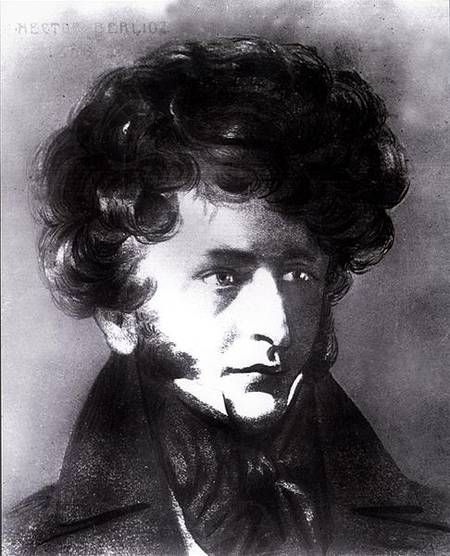With superb assist by Depardieu, Muti and CSO bring “Lélio” back to life

Riccardo Muti and the Chicago Symphony Orchestra performed music of Berlioz Saturday at Carnegie Hall. Painting: Emile Signol
Saturday evening’s all-Berlioz program with the Chicago Symphony Orchestra led by music director Riccardo Muti was the second concert in the orchestra’s three-day residency at Carnegie Hall. The fascinating, if extravagant program offered a rare opportunity to hear the Symphonie Fantastique followed by its sequel, Lélio, in performances Berlioz could scarcely have dreamt of.
Following on the heels of Friday’s concert performance of Verdi’s Otello the program began with a rendition of Symphonie Fantastique, which quickly took on the character of an opera without words. Muti executed the vivid Berlioz score with an icy exactitude matched by brilliant playing from the Chicago musicians. While the performance was undeniably dazzling, the impressive precision and control precluded the element of risk and wildness embodied in this revolutionary score. At the end, in the “Dream of a Witches’ Sabbath” one was more awed by the powerful sound of this great orchestra, than moved by the horror of the death-filled dream the music depicts.
Lélio, or “The Return to Life “is a melodrama that Berlioz called “half music, half poetry.” In this fascinating performance, the work came across as a nineteenth-century version of what today might be called a “multi-media” event.
As in any good sequel, the beginning takes up where the original left off, with the narrator reflecting on the horror of the dream he’s just had. Gradually, with each musical episode as he meditates on the greatness of art, on Shakespeare and the power of music, he is returned to life.
It is not hard to understand why performances of Lélio are so rare given the forces required, both musical and dramatic. In addition to the ample Symphonie Fantastique orchestration, Berlioz adds one actor, tenor and bass-baritone soloists, a four-part chorus and a solo piano. For these performances, Muti again enlisted Gerard Depardieu, arguably still the most famous French actor of our era.
By his very presence Depardieu seemed to represent the whole French nation, and Berlioz himself. Standing, leaning or slouching on an upholstered armchair of no specific period, he was immediately able to personify the person who has just experienced all the events of the preceding symphony. With the house and stage lights darkened, music stand lights obscured by curtains, soloists and chorus provided with individual score lights, the focus of the activity on stage was centered on Depardieu.
Most of the six musical interludes in Lélio are crafted from earlier compositions. The last and best known is a fantasy on Shakespeare’s The Tempest composed in 1830. Before the fantasy is played, the narrator who has clearly taken on the role of Berlioz, instructs the orchestra and the conductor how to execute the score (“Violins, have your mutes ready; those in the back of the orchestra, do not lag behind.”) By this point in the evening the audience was charmed by the entertainment Berlioz provides.
After the Tempest music is played the narrator praises their performance for “precision, warmth, control and subtlety.” No less can be said of the Chicago Symphony Orchestra and Chorus, the excellent soloists Mario Zeffiri, tenor and Kyle Ketelson, bass-baritone, all under the baton of Riccardo Muti. At the end of this unusual and compelling evening some of the audience, in keeping with the Romantic spirit of the music, tossed white roses on stage during the prolonged ovation.
Hester Furman served as music director for both WQXR and WNYC New York Public Radio. As an independent producer she created a series of feature programs about American music for BBC Radio 3. Hester Furman did her undergraduate work at the Manhattan School of Music and Barnard College.
Posted Apr 17, 2011 at 9:18 pm by Richard Vas Dias
We were there, but not there–rather, transported beyond: “Fantastique” was the wondrous storm of music that it usually is, tenderly and sharply rendered by Muti and the Chicago gang as would have pleased and amazed its composer. The melancholy of Lelio demonstrates how close to maudlin human emotion– struggling to grasp and articulate the sublime–can get. Shakespeare and Berlioz understood this–conductor, musicians, singers, and narrator effectively conveyed the theme.
Posted Apr 18, 2011 at 9:32 am by Al Schlachtmeyer
It’s hard to imagine a better combination of talent and venue for what was a truly spectacular evening. Sure, the symphony is part graceful dream and part bombastic showpiece, and Lelio is an uneven, self-indulgent melodrama. But they both have moments that take the listener into another realm. And they both broke new ground in their time. In this dramatically pointed meticulously polished performance, this listener just let it wash all over him, reasonably confident he’ll never hear it all again and completely sure he’ll never hear it done better.
Posted Apr 20, 2011 at 1:11 pm by muriel castille
C’était merveilleux, époustoufflant et émouvant.
Une oeuvre iconoclaste grandiose interprétée magistralement par une foule de talentueux artistes: choristes, musiciens, Muti, Depardieu et Berlioz lui même réincarné et présent dans ce mythique Carnagie Hall…
Une rencontre au sommet de géants.
Bravo et merci.